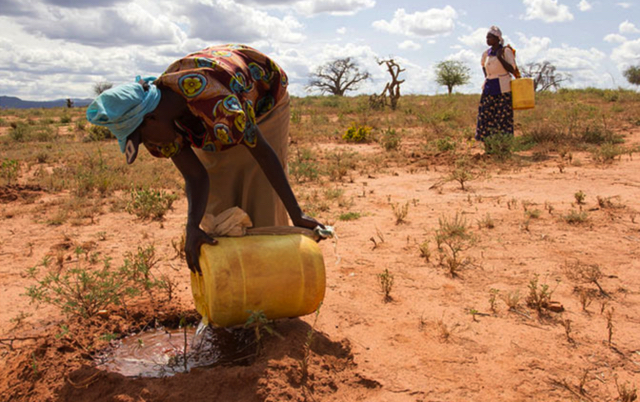Climate Change Adaptation And Job Creation In Africa's Green Economy

Table of Contents
The Urgent Need for Climate Change Adaptation in Africa
The impacts of climate change are already severely affecting Africa. Increased temperatures, erratic rainfall patterns, and more frequent extreme weather events are causing widespread devastation. These impacts have profound socioeconomic consequences, hindering progress towards sustainable development goals.
- Increased frequency and intensity of extreme weather events: Droughts, floods, and storms are becoming more common and intense, causing widespread damage to infrastructure, agriculture, and livelihoods.
- Threats to food security and water resources: Changing rainfall patterns and water scarcity are jeopardizing food production, leading to malnutrition and hunger, particularly in vulnerable communities. This also impacts access to clean drinking water, exacerbating public health challenges.
- Displacement and migration due to environmental degradation: Desertification, land degradation, and sea-level rise are forcing people to leave their homes, creating internal displacement and cross-border migration.
- Negative impacts on public health: Climate change exacerbates existing health challenges, increasing the spread of infectious diseases and impacting mental health due to displacement and loss of livelihood.
Climate change adaptation is therefore not merely an environmental concern; it's a crucial strategy for mitigating these devastating impacts and building a more resilient and prosperous future for Africa. Investing in adaptation measures is essential for protecting lives, livelihoods, and the environment.
Green Economy Sectors Driving Job Creation
The transition to a green economy offers a powerful pathway to both climate change adaptation and job creation in Africa. Several key sectors are poised to generate significant employment opportunities:
Renewable Energy
Africa possesses abundant renewable energy resources, including solar, wind, hydro, and geothermal energy. Developing these resources can create millions of jobs across the value chain, from manufacturing and installation to operation and maintenance.
- Opportunities in off-grid energy solutions for rural communities: Providing access to clean, reliable energy in rural areas through mini-grids and standalone solar systems can create numerous jobs in installation, maintenance, and distribution.
- Growth of the solar power industry and related job roles: The rapid expansion of the solar power industry is creating a surge in demand for skilled workers in areas like solar panel manufacturing, installation, and repair.
- Development of smart grids and energy storage technologies: Investment in smart grid technologies and energy storage solutions will further drive job creation in engineering, technology, and management.
Climate-Resilient Agriculture
Sustainable agricultural practices are vital for adapting to climate change and ensuring food security. Promoting climate-resilient agriculture can create significant employment opportunities in rural areas.
- Increased demand for agricultural technicians and specialists: There is a growing need for agricultural technicians and specialists who can advise farmers on climate-smart agricultural practices.
- Growth of the organic farming sector: The increasing demand for organic and sustainably produced food offers opportunities in organic farming, processing, and marketing.
- Development of climate-smart irrigation systems: Investing in efficient and sustainable irrigation systems can create jobs in installation, maintenance, and management.
Green Tourism and Ecotourism
Eco-friendly tourism initiatives can contribute significantly to both conservation efforts and job creation. By promoting sustainable tourism practices, Africa can attract environmentally conscious travelers while creating employment opportunities.
- Development of national parks and wildlife reserves: Protecting and developing national parks and wildlife reserves creates jobs in conservation, guiding, and hospitality.
- Growth of community-based tourism projects: Community-based tourism initiatives empower local communities by generating income and creating jobs in hospitality, guiding, and craft production.
- Opportunities in sustainable tourism certification and management: The increasing demand for sustainable tourism practices creates opportunities in certification, training, and management.
Green Infrastructure Development
Investing in climate-resilient infrastructure is crucial for both adaptation and job creation. This includes projects focused on improved water management, sustainable transportation, and green buildings.
- Construction and maintenance of water harvesting systems: Building and maintaining water harvesting systems creates jobs in construction, engineering, and operation.
- Development of public transport systems and cycling infrastructure: Investing in sustainable transportation systems like public transport and cycling infrastructure generates jobs in construction, operation, and maintenance.
- Green building certifications and construction techniques: The growing adoption of green building standards creates opportunities for skilled workers in green construction, energy efficiency, and sustainable building materials.
Policy and Investment Strategies for Job Creation in Africa's Green Economy
To effectively leverage the job creation potential of a green economy, supportive policies and substantial investment are essential. This requires a collaborative effort involving governments, the private sector, and international organizations.
- Incentives for renewable energy development and adoption: Governments can incentivize renewable energy development through tax breaks, subsidies, and feed-in tariffs, attracting private investment and stimulating job creation.
- Investment in education and training programs for green jobs: Investing in education and training programs is crucial to equip the workforce with the skills needed for green jobs.
- Access to financing for green businesses and entrepreneurs: Providing access to financing for green businesses and entrepreneurs is critical for fostering innovation and driving growth in the green economy.
- International collaboration and technology transfer: International collaboration and technology transfer can facilitate the adoption of green technologies and best practices, accelerating the transition to a green economy.
Conclusion
Climate change adaptation is not just an environmental imperative for Africa; it's an economic opportunity. By investing in a green economy, African nations can create millions of jobs, enhance resilience to climate change, and foster sustainable development. The potential for job creation in renewable energy, climate-resilient agriculture, green tourism, and green infrastructure is immense. However, realizing this potential requires concerted efforts from governments, the private sector, and international partners to implement supportive policies and attract investments. Embrace the potential of climate change adaptation and job creation in Africa's green economy. Invest in sustainable solutions, support green businesses, and advocate for policies that prioritize a greener future for the continent. Let's work together to build a resilient and prosperous Africa.

Featured Posts
-
 Michael Clifford On Daughters Future Anything She Wants She Ll Have Nepo Baby Comments Explained
Apr 26, 2025
Michael Clifford On Daughters Future Anything She Wants She Ll Have Nepo Baby Comments Explained
Apr 26, 2025 -
 Analyzing The Contribution Of European Shipyards To Russias Arctic Gas Industry
Apr 26, 2025
Analyzing The Contribution Of European Shipyards To Russias Arctic Gas Industry
Apr 26, 2025 -
 Callaway Parker Delivered To Ptc By Verret Waterways Journal Update
Apr 26, 2025
Callaway Parker Delivered To Ptc By Verret Waterways Journal Update
Apr 26, 2025 -
 The Los Angeles Wildfires And The Ethics Of Disaster Betting
Apr 26, 2025
The Los Angeles Wildfires And The Ethics Of Disaster Betting
Apr 26, 2025 -
 Trumps Ukraine Peace Push Russia Emerges As Unexpected Roadblock
Apr 26, 2025
Trumps Ukraine Peace Push Russia Emerges As Unexpected Roadblock
Apr 26, 2025
